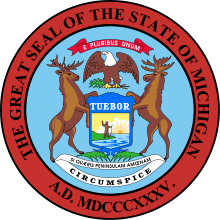Michigan Senate
| Michigan State Senate | |
|---|---|
| Michigan State Legislature | |
 | |
| Type | |
| Type |
Upper house of the Michigan Legislature |
Term limits | 2 terms (8 years) |
| History | |
| Founded | January 26, 1837 |
| Preceded by | Michigan Territorial Council |
New session started | January 9, 2018 |
| Leadership | |
Senate Majority Leader | |
Senate President Pro Tempore | |
Senate Minority Leader | |
| Structure | |
| Seats | 38 voting members |
 | |
Political groups |
Majority
Minority
|
Length of term | 4 years |
| Authority | Article IV, Michigan Constitution |
| Salary | $71,685 salary/year + $10,800 per diem/year |
| Elections | |
Last election |
November 4, 2014 (38 seats) |
Next election |
November 6, 2018 (38 seats) |
| Redistricting | Legislative control |
| Motto | |
| In God We Trust | |
| Meeting place | |
 | |
|
State Senate Chamber Michigan State Capitol Lansing, Michigan | |
| Website | |
| Michigan State Senate | |
The Michigan Senate is the upper house of the Legislature of the U.S. State of Michigan. Along with the House of Representatives, it composes the Michigan Legislature. Article IV of the Michigan Constitution, adopted in 1963, defines the role of the Legislature and how it is to be constituted.[1] The primary purpose of the Legislature is to enact new laws and amend or repeal existing laws. The Michigan Senate is composed of 38 members, each elected from a single-member district with a population of between approximately 212,400 to 263,500 residents.[2] Legislative districts are drawn on the basis of population figures, provided by the federal decennial census. Senators' terms begin immediately upon their election. As of 2018, Republicans hold the majority in the State Senate with twenty-seven seats; Democrats hold the minority with eleven seats.The Senate Chamber is located in the State Capitol building.[2]
Titles
Members of the Senate are referred to as Senators. Because this shadows the terminology used to describe members of U.S. Senate, constituents and the news media, using The Associated Press Stylebook, often refer to State Senators as State Senators to avoid confusion with their Federal counterparts.
Terms
Senators are elected on a partisan basis for four-year terms, concurrent with the election of the Governor of Michigan. Terms for Senators begin on January 1 at Noon, following the November General Election and end on January 1 when their replacements are sworn in.[2]
Senate Elections are always held two years after the Election for President of the United States, with the next Election scheduled for November 6, 2018.
Term limits
On November 3, 1992, almost 59 percent of Michigan voters backed Proposal B, the Michigan Term Limits Amendment, which amended the State Constitution, to enact term limits on federal and state officials. In 1995, the U.S. Supreme Court ruled that states could not enact congressional term limits, but ruled that the state-level term limits remain. Under the amendment, a person could be elected to the office of State Senate two times. A provision governing partial terms was also included. These provisions became Article IV, section 54 and Article V, section 30 of the Michigan Constitution.[3]
Qualifications
Each Senator must be a citizen of the United States, at least 21 years of age, and an elector of the district he represents. Under state law, moving out of the district shall be deemed a vacation of the office. No person who has been convicted of subversion or who has within the preceding 20 years been convicted of a felony involving a breach of public trust shall be eligible for either house of the Legislature.
Legislative session
For reckoning periods of time during which the Legislature operates, each two-year period coinciding with the election of new members of the House of Representatives is numbered consecutively as a legislature, dating to the first legislature following Michigan's admission as a state. The current two-year term of the legislature (January 1, 2017 – December 31, 2018) is the 99th Legislature.
Each year during which the Legislature meets constitutes a new legislative session. According to Article IV Section 13 of the State Constitution, a new session of the Legislature begins when the members of each house convene, on the second Wednesday of January every year at noon. A regular session of the Legislature typically lasts throughout the entire year with several periods of recess and adjourns sine die in late December.
The Michigan Legislature is one of ten full-time state legislative bodies in the United States.[4] Members receive a base salary of $71,685 per year, which makes them the fourth-highest paid legislators in the country, after California, Pennsylvania and New York. While legislators in many states receive per diems that make up for lower salaries, Michigan legislators receive $10,800 per year for session and interim expenses.[5] Salaries and expense allowances are determined by the State Officers Compensation Commission.
Any legislation pending in either house at the end of a session that is not the end of a legislative term of office continues and carries over to the next Legislative Session.
Powers and process
The Michigan Legislature is authorized by the Michigan Constitution to create and amend the laws of the U.S. state of Michigan, subject to the Governor's power to veto legislation. To do so, legislators propose legislation in the forms of bills drafted by a nonpartisan, professional staff. Successful legislation must undergo committee review, three readings on the floor of each house, with appropriate voting majorities, as required, and either be signed into law by the Governor or enacted through a veto override approved by two-thirds of the membership of each legislative house.[6]
Composition
| Affiliation | Party (Shading indicates majority caucus) |
Total | ||||
|---|---|---|---|---|---|---|
| Republican | Democratic | Vacant | ||||
| End of Previous Legislature | 26 | 12 | 38 | 0 | ||
| Begin 2015 session | 27 | 11 | 38 | 0 | ||
| April 12, 2016[7] | 10 | 37 | 1 | |||
| November 8, 2016[8] | 11 | 38 | 0 | |||
| March 2, 2018[9] | 10 | 37 | 1 | |||
| Latest voting share | 73% | 27% | ||||
Leadership
The Michigan Senate is headed by the Lieutenant Governor of Michigan, who serves as President of the Senate but may only cast a vote in the instance of a tie.[10] The presiding officers of the Senate, apart from the President, are elected by the body at its first Session and serve until their term of office is up.[11] Majority and Minority party officers are elected at the same time by their respective caucuses.[11]
The Senate Majority Leader controls the assignment of committees and leadership positions, along with control of the agenda in the chamber.
- President of the Michigan Senate: Brian Calley ((R)[12]
- President Pro Tempore of the Michigan Senate: Tonya Schuitmaker ((R)
- Majority Leader of the Michigan Senate: Arlan Meekhof ((R)
- Assistant President Pro Tempore of the Michigan Senate: Margaret O'Brien
- Associate President Pro Tempore of the Michigan Senate: Hoon-Yung Hopgood
- Assistant Majority Leader: Goeff Hansen ((R)
- Majority Floor Leader: Mike Kowall ((R)
- Assistant Majority Floor Leader: Jim Stamas ((R)
- Majority Caucus Chairperson: David B. Robertson ((R)
- Assistant Majority Caucus Chairperson: Rick Jones ((R)
- Majority Whip: Jack Brandenburg ((R)
- Assistant Majority Whip: Darwin L. Booher ((R)
- Minority Leader of the Michigan Senate: Jim Ananich ((D)
- Assistant Minority Leader: Steve Bieda ((D)
- Minority Floor Leader: Morris Hood III ((D)
- Assistant Minority Floor Leader: Coleman Young II ((D)
- Minority Caucus Chair: David Knezek ((D)
- Assistant Minority Caucus Chair: Vincent Gregory ((D)
- Minority Whip: Curtis Hertel Jr. ((D)
- Assistant Minority Whip: Vacant
Members, 2016-2018
Past composition of the Senate
See also
External links
References
- ↑ "State Constitution of Michigan Article IV Section I". Michigan Legislature.
- 1 2 3 "Senate Information". Michigan Senate.
- ↑ "Constitutional Amendments" (PDF). Michigan Legislature.
- ↑ http://www.ncsl.org/research/about-state-legislatures/full-and-part-time-legislatures.aspx
- ↑ National Conference of State Legislatures
- ↑ "Citizens Guide". Michigan House of Representatives.
- ↑ Democrat Virgil Smith Jr. (District 4) resigned after pleading guilty to assault.
- ↑ Democrat Ian Conyers elected to succeed Smith.
- ↑ Democrat Bert Johnson (District 2) resigns.
- ↑ "Michigan State Constitution - Article V, Section 25". Michigan Legislature.
- 1 2 "Senate Rules - Chapter 1, Section 1". Michigan Senate. Michigan State Senate. Retrieved 26 December 2016.
- ↑ "Senate Leadership". Michigan Senate.